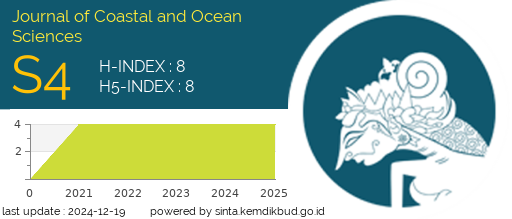Storage Temperature on the Product Quality of Several Pro Coffee Variants That Contain (Bacillus cereus SN7)
DOI:
https://doi.org/10.31258/jocos.6.3.197-201Keywords:
Microbes, Organoleptic test, Shelf life, Single cell protein, Total plate countAbstract
This study aims to analyze the effect of storage temperature on microbial growth in several pro coffee variants and to investigate the impact of storage temperature on the quality of pro coffee containing B. cereus SN7. The coffee variants used were original, latte, original jelly, and latte jelly at temperatures of 10, 25, and 37°C for 7 days of storage. Microbial growth was observed using the total plate count method, while the pro coffee quality was analysed using the organoleptic test. The results showed that low storage temperatures can inhibit microbial growth and maintain the quality of pro coffee. The lowest total number of microbes was found in the original variant with a storage temperature of 10°C, with a value of 0.11 × 103 CFU/mL, and the highest total number of microbes was found in the latte jelly variant with a storage temperature of 25°C, with a value of 3.476 × 103 CFU/mL. In the organoleptic test, the highest value was found in the latte variant coffee at a storage temperature of 10°C, categorized as 'very like', with a value of 35% for taste, 30% for aroma, and 30% for colour. The effect of temperature on the product quality of several probiotic coffee variants containing B. cereus SN7 showed a significant difference (p < 0.05) in microbial growth and the quality value of the probiotic coffee. Statistical analysis showed the effect of temperature on the product quality of several pro coffee variants containing B. cereus SN7.
Downloads
References
[BPOM] Badan Pengawas Obat & Makanan Republik Indonesia. (2019). Peraturan Badan Pengawas Obat dan Makanan Nomor 13 Tahun 2019 Tentang Batas Maksimal Cemaran Mikroba dalam Pangan Olahan. Indonesian Drug and Food Control, 1–48.
Afrianti, H.L. (2008). Teknologi Pengawatan Pangan. Bandung. Alfabeta.
Feliatra, F., Nursyirwani., Tanjung, A., Adithiya, D. S., Susanna, M., & Lukistyowati, I. (2018). The Effectiveness of Heterotrophic Bacteria Isolated from Dumai Marine Water of Riau, Used as Antibacterial Against Pathogens in Fish Culture. IOP Conference Series: Earth and Environmental Science, 116(1).
Karlida, I., & Musfiroh, I. (2017). Suhu Penyimpanan Bahan Baku dan Produk Farmasi di Gudang Industri Farmasi. Jurnal Farmaka, 15(4): 2716-3075.
Mardalisa, M., Fatwa, E.B., Yoswaty, D., Feliatra, F., Effendi, I., & Amin, B. (2021). Isolasi dan Identifikasi Bakteri Indigenous Pendegradasi Plastik dari Perairan Laut Dumai Provinsi Riau. Jurnal Ilmu Perairan (Aquatic Science), 9(1): 77– 85.
Nasution, B.B. (2018). Speciality Kopi Indonesia. Directorate General of National Export Development. Jakarta.
Sari, D., & Hadiyanto, A. (2013). Teknologi dan Metode Penyimpanan Makanan Sebagai Upaya Memperpanjang Shelf Life. Jurnal Aplikasi Teknologi Pangan, 2(2): 2460-5921.
Sridevi, G.B., Devendra, H., Basavaraj, K., & Pushpa, S. (2019). Coffee Starter Microbiome and In Silico Approach to Improve Arabica Coffee. Journal of Food and Technology, 1-20.
Wati, R.Y. (2018). Pengaruh Pemanasan Media Plate Count Agar (PCA) Berulang Terhadap Uji Total Plate Count (TPC) di Laboratorium Mikrobiologi Teknologi Hasil Pertanian Unand. Journal Tampela, 1(2).
Downloads
Published
Issue
Section
License
Copyright (c) 2025 Muhammad Fhito Al Farisy, Feli Feliatra, Ummi Mardhiah Batubara (Author)

This work is licensed under a Creative Commons Attribution 4.0 International License.





